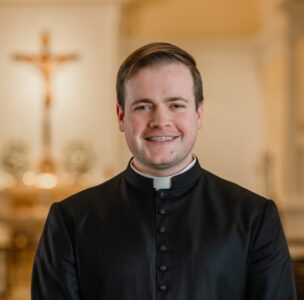Brothers and Sisters in Christ,
This Sunday we begin a sequence of Gospel readings that will take us through the 6th chapter of John. I encourage everyone to read through this chapter on their own. The Gospel of John stands out from the other three, considered the “Synoptic Gospels” for they are summaries or synopses of Christ’s life. At the same time, John has a very distinct writing style; in many ways, his writing delves even deeper spiritually and theologically.
This 6th chapter of John is foundational for the theology of the Eucharist. In the other Synoptic Gospels, the link between the multiplication of the loaves and the Eucharist can be reasonably presumed. It is in the Gospel of John that the link becomes explicit and serves as a precursor to the institution of the Eucharist. In this case, there was a trust in Christ along with the generosity of giving up the five loaves and two fishes. The constant lesson of essentially all of Christ’s miracles involves the interplay between an act of faith consisting of total self-gift and the exercise of divine power.
The timing of this miracle around Passover, and the fact that John mentions it specifically, implies a connection between the Jewish feast and its ultimate fulfillment and perfection in the institution of the Eucharist, the new Passover. To compare this scene with what we are familiar with in the Holy Sacrifice of the Mass, the words or formula expressed here are very close to the description in the Synoptic Gospels of the actions of Christ at the Last Supper, where he instituted the Eucharist. The important phrase, “gave thanks” should stand out. This term in Greek is “eucharisteo” (εὐχαριστέω) which is why we use the word “Eucharist” regarding this great sacrament. Giving thanks is at the ultimate root of how we understand Christ’s presence under the species of bread and wine.
At the end of this scene, Jesus withdrew. The people acclaimed Christ for his miracle, but they sought to make him a temporal king who would provide for their material needs, show military power, and liberate the Jews from Roman rule. Christ left the scene before that swell of support could take place, for although he is a king, his kingdom is not of this world. For those who were present, experiencing that miraculous and generous gift, their bellies were filled. When we gather before the sacred altar of God we have before us something far greater than the multiplication of bread and fish, we have Christ himself. Mass is a holy sacrifice that is much more than a meal. When we leave Mass our bellies may not be full, but receiving the Eucharist worthily and well, our souls receive its proper nourishment. We receive our creator who has made us in his own image and likeness, therefore it is only he who can fill our souls, hearts, and lives most fully.
Yours in Christ,
Fr. Brendan


